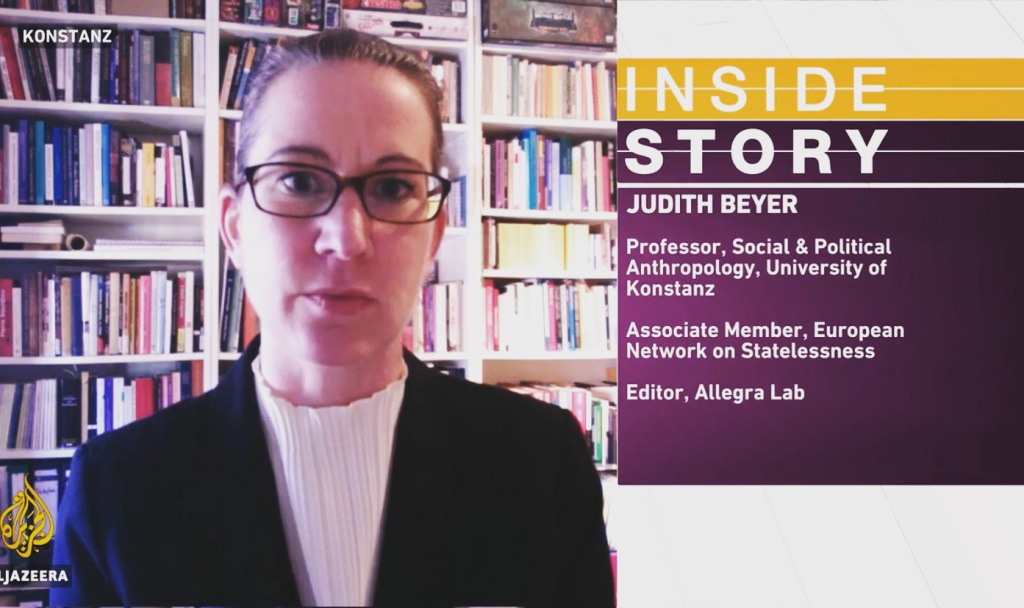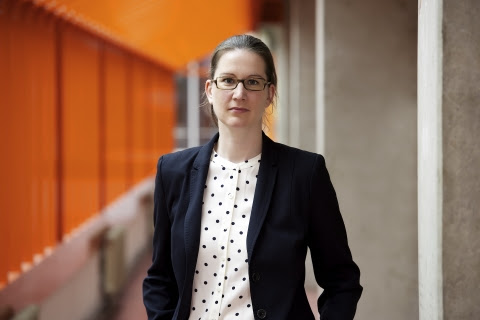On January 27, 2020 at 4.20am, my beloved Kyrgyz grandmother, Baiyz Apa, passed away. She had been waiting for this moment for the last five years, asking Kudai (Allah) to please bring her home. I lived in her home for one and a half years between 2005 and 2006 and have frequen tly returned in 2008, 2010, 2015 for further ethnographic research and whenever it was possible. The last time I “saw” her was in December 2019 when her great-grandchildren recorded an Instagram videomessage of hers for me. Who would have thought this to be possible? I carried out research at a time when there were only two telephones in the village: one at the mayor’s office and one at the peregovornyi punkt – the post office. Both almost never worked. When I wanted to talk to my parents or grandparents in Germany, I needed to travel for 40km into Talas town and hope for either a mobile signal or use one of the telephones there … Now Baiyz Apa was on Instagram, telling me that we have not seen each other in a long time. She was right. I could see that she was very weak but her mind was sharp as always. I showed her message to my son, whom she named when he was born. She gave me two options — Aralbek or Zhangybek — the first indicating the child to be the “leader” of Aral, the village we all lived in, the second meaning that of a “new leader.” Of course I chose the second.
tly returned in 2008, 2010, 2015 for further ethnographic research and whenever it was possible. The last time I “saw” her was in December 2019 when her great-grandchildren recorded an Instagram videomessage of hers for me. Who would have thought this to be possible? I carried out research at a time when there were only two telephones in the village: one at the mayor’s office and one at the peregovornyi punkt – the post office. Both almost never worked. When I wanted to talk to my parents or grandparents in Germany, I needed to travel for 40km into Talas town and hope for either a mobile signal or use one of the telephones there … Now Baiyz Apa was on Instagram, telling me that we have not seen each other in a long time. She was right. I could see that she was very weak but her mind was sharp as always. I showed her message to my son, whom she named when he was born. She gave me two options — Aralbek or Zhangybek — the first indicating the child to be the “leader” of Aral, the village we all lived in, the second meaning that of a “new leader.” Of course I chose the second.

It was through her blessing, I believe and she believed, that he came into the world. I remember very clearly how I had asked her in 2010 to please give me a bata so that I would give birth to a child. And she did. But beyond her blessing, Baiyz Apa has given me many other things: It is through her that I truly came to understand what growing up in one of the remotest parts of the Soviet Union must have meant for a woman. It was through her that I understood that as a woman one can do ANYTHING. She gave birth to 11 children … the first 4 died. After the fourth death, she consulted with the village imam at a time when “being a Muslim” was forbidden in Kyrgyzstan. He advised her to pray — so she began to learn to “read namaz” five times a day and thanks to Allah, her fifth child — a boy — lived. After him, she had six other children and also adopted a daughter.
It was probably half way into my fieldwork (which was devoted to understanding legal pluralism in Kyrgyzstan) that I realized how interesting Baiyz Apa’s life history was. And I asked her whether she would like me to write it down for her. She said “if it helps you with your work, I will.” And so it was not out of self-interest, but of generosity that she agreed to dig deep into her memories and tell me story after story after story for weeks on end.
 I had been smart enough not to impose a linear structure onto the way she was telling her life story by not asking her to go back as far as she remember and start from there until we would have reached the present time. In contrast, I had asked her to start from the most important event in her life. What was she most proud of? And she began to talk about how she had managed to marry off all of her children as a single working mother. Her husband had been much older than her and had died early, so that she was left with the burden of not only working full time in the Kolchoz, but also raising her children alone, being responsible for her household and — everyone familiar with Central Asia knows how difficult this is — finding money and ways to participate in the life-cycle rituals: births, birthdays, graduation ceremonies, marriages, funerals, mourning rituals, to only name the most important ones. I also vividly remember her story about how much she wanted to go to school and how she walked for hours on end from the pasture down to the valley each morning in the dark to attend the village school there, together with only boys. How she was married to a man much older than her since all younger men had gone to the war — partly fighing in Germany — maybe against my own grandfather at the time.
I had been smart enough not to impose a linear structure onto the way she was telling her life story by not asking her to go back as far as she remember and start from there until we would have reached the present time. In contrast, I had asked her to start from the most important event in her life. What was she most proud of? And she began to talk about how she had managed to marry off all of her children as a single working mother. Her husband had been much older than her and had died early, so that she was left with the burden of not only working full time in the Kolchoz, but also raising her children alone, being responsible for her household and — everyone familiar with Central Asia knows how difficult this is — finding money and ways to participate in the life-cycle rituals: births, birthdays, graduation ceremonies, marriages, funerals, mourning rituals, to only name the most important ones. I also vividly remember her story about how much she wanted to go to school and how she walked for hours on end from the pasture down to the valley each morning in the dark to attend the village school there, together with only boys. How she was married to a man much older than her since all younger men had gone to the war — partly fighing in Germany — maybe against my own grandfather at the time.
I will always remember Baiyz Apa for her straightforwardness. In Kyrgyzstan, it is sometimes not customary to tell things as they are — something I learned the hard way, being extremely straightforward myself. But we were very much alike in this way. She would speak out and she would speak up. When once a thief stole the potatoes out of her house’s cellar during spring, she faced him after the villagers had caught him; and while he had returned all the sacks and wanted to ask for forgiveness, she made him take them back and plant them on his own land. Her family was not happy about this as these potatoes had been meant for planting and it is on the potato harvest that villagers in Aral base their life-cycle economy. But she would no longer have what a thief had touched, she said. She was strong- willed and proud, that way …
Baiyz Apa refused to speak Russian during the Soviet Union although she perfectly understood. She never bowed down to authorities. When she worked in the Kolchoz as an accountant (schetchik), she managed to go around ‘the system’ without entering into moral conflict with her religious belief to which she sticked no matter how unusual it must have been for a woman to pray while the state preached atheism. She worked on an opium plantation in the mountains, she drove a tractor, she flew to the southern part of the country at a time when many women had never even set foot outside of their villages.
 Most of all, however, she was the kindest, funniest person I came to know in Kyrgyzstan. I will never forget how the night before one of my departures from Aral, she had worked until the morning hours to finish a shyrdak and a töshök — two traditional Kyrgyz carpets and cushions — for me to take home. Her daughter-in-law had told me how she dripped black tea into her eyes to “stay awake.”
Most of all, however, she was the kindest, funniest person I came to know in Kyrgyzstan. I will never forget how the night before one of my departures from Aral, she had worked until the morning hours to finish a shyrdak and a töshök — two traditional Kyrgyz carpets and cushions — for me to take home. Her daughter-in-law had told me how she dripped black tea into her eyes to “stay awake.”
Baiyz Apa is home now. I am happy for her. She told all of us not to cry for “an old woman.” Usually I listened to her, like a good daughter or granddaughter would. But in this case I cannot. I will always miss her and I am grateful to have met her.
Her life history which I wrote down was published in Kyrgyz in 2010. I release the pdf-file of her book Baiyz Apanyn Zhashoo Tarzhymaly here – in honour of Baiyz Apa and for everyone to read, beyond Aral and the other villages where the book has been distributed to.
Anyn arty kairluu bolsun!














